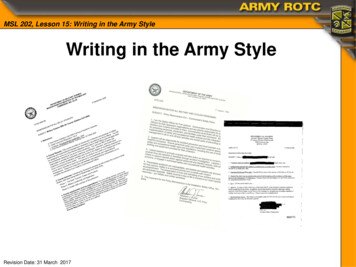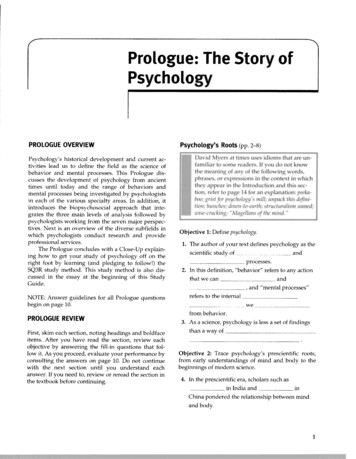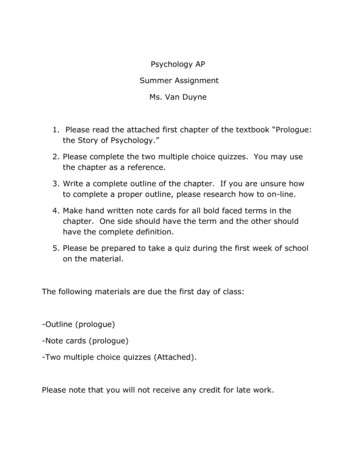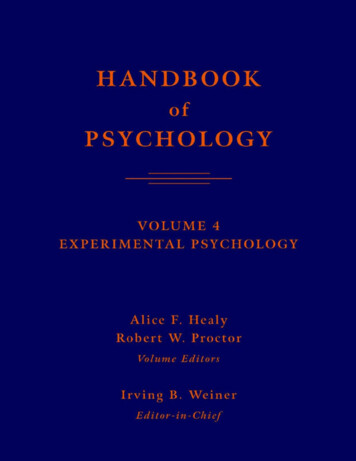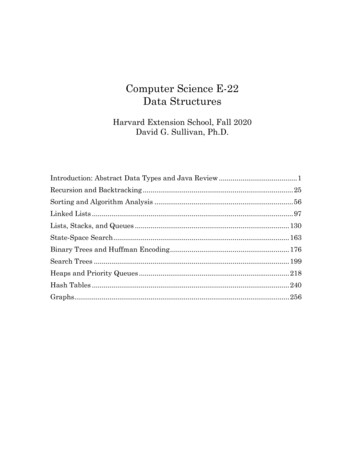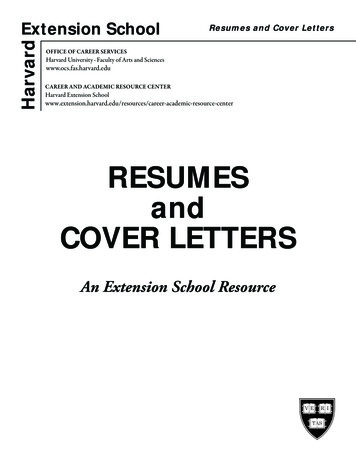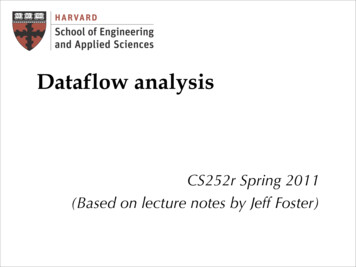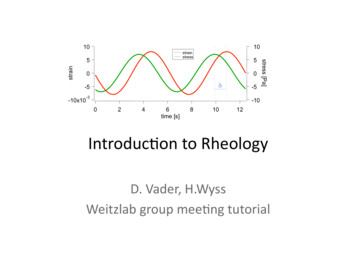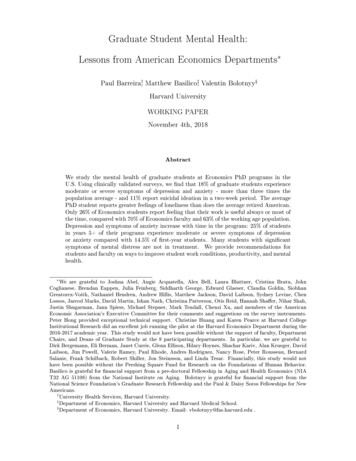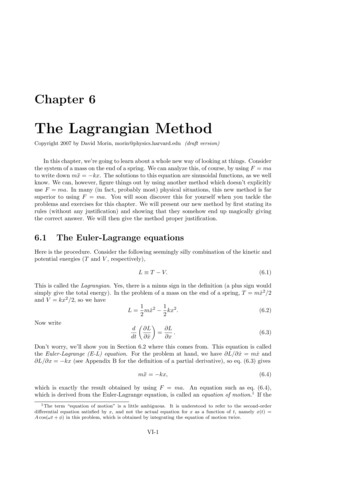
Transcription
Writing for PsychologyA Guide for Psychology ConcentratorsDepartment of PsychologyFaculty of Arts and SciencesHarvard UniversityHARVARDCOLLEGE
Writing for PsychologyA Guide for Psychology ConcentratorsbyShelley H. CarsonJeanne FamaKate ClancyJeffrey EbertAdrienne Tierney
Cover photo credit: Harvard News OfficeCopyright 2012, President and Fellows of Harvard College
Table of ContentsAcknowledgements 1Introduction.3Chapter OneHow to Read Sources Critically .5Chapter TwoWriting a Conceptually Coherent Paper.13Academic Honesty in Writing.22Chapter ThreeDo’s and Don’ts of Effective Writing in Psychology.24Chapter FourAPA Format Guidelines .30Appendix:Locating Databases and Sources in theHarvard Library System.38
AcknowledgementsThis booklet contains the accumulated wisdom of a number of eminent psychologistsand writing experts, including Daryl Bem, Stephen Kosslyn, Brendan Maher, Joseph M.Williams, and the authors responsible for the American Psychological Association stylemanual. We have also drawn on the keen observations of Baumeister and Leary (1997)and Gordon Harvey (2002).We would like to thank Stephen Kosslyn, C.A. Meyersburg, Kristina Olson, JamesHerron, and Laura Chivers for their input and assistance in the preparation of this guide.This guide was prepared with the financial support from the Harvard WritingProject.Writing for Psychology page 1
learned in Expository Writing. In Expos, you were taught general academic guidelinesfor formulating a thesis, providing a motive for the thesis, supporting this thesis withconvincing evidence, and anticipating objections from readers.You were also taught theprinciples basic to scholarly writing across the curriculum.These critical thinking/writing skills, as well as the ability to form and support an argument, create a foundationon which you will build the more specialized skills required for psychological writing.Writing in the field of psychology (like writing in any specialized field) differs inseveral respects from the general academic writing style you learned in Expos. Psychological writing is a form of scientific reporting that is based on American Psychological Association publication style, widely recognized as a standard for scientific writing.The format employed in psychological writing (APA style, discussed below) reflects theprinciples of clarity, concise wording, and accuracy and facilitates the rapid andlogical flow of information from author to reader. Thus, scientific writing values prosethat is more straightforward, objective, and less reflective than what you may be used to.In the beginning, you may feel that APA style is dry and colorless, and that it stifles yourcreativity. However, after a bit of experience, you will find that the guidelines delineatedby APA style will help you to write clear, informative, interesting papers. Creativity inpsychology tends to come from the ideas behind the writing, not the writing itself.This booklet is designed to acquaint you with the basic principles of psychologicalwriting and to help you avoid pitfalls that beginning writers in the field often encounter.First, in How to Read Sources Critically, we will discuss why it is important to for youto be a discerning reader of the work of other psychologists, and we will present guidelines to help you read critically. In Writing a Conceptually Coherent Paper, we will gothrough, step by step, the process of writing an essay or term paper in psychology. Thesection on Academic Honesty in Writing reinforces information you have previouslyreceived about using sources responsibly (and avoiding plagiarism).The Do’s and Don’tsfor Effective Writing in Psychology include examples of common mistakes made bybeginning writers in the field. Finally, the APA Format Guidelines summarizes some ofthe basic elements of APA style.For more complete information on science writing, psychological writing, and APAstyle, we recommend the Publication Manual of the American Psychological Association, 6thEdition (2009) and the APA Style Guide to Electronic References, as well as the other excellent references listed at the end of this booklet.introductionWriting for psychology incorporates many of the organizational elements youWriting for Psychology page 3
How to Read SourcesCriticallyThe first step in learning to write well in field of psychology is to learn to read sourcescritically. There are at least two reasons for this:1.In order to write well, you must be well informed about the subject matter.2.By training yourself to spot strengths and weaknesses in others’ theses, arguments, methodologies and conclusions, you will become more aware ofstrengths and weaknesses in your own work. This awareness should help youto become a critical reader of your own writing.Researchers write review papers, theoretical papers, and reports of empirical studies inorder to advance a point of view. You, as a reader, are more likely to adopt a writer'spoint of view if the writer backs up this point of view with solid evidence. As a criticalreader of psychological literature, you must consider both the quality and the quantityof the evidence that a writer uses to support his or her argument.You will also need toconsider the following: implicit or explicit author bias (the author’s agenda) soundness of the methodology appropriateness of the statistical analyses whether the strength of the conclusions matches the strength of the evidenceThis section of the guide will teach you to make these determinations about the qualityof evidence, which will help you to read sources critically and to write your own paperspersuasively.I. Consider Whether the Information in the Sourceis EvidenceWhat is viewed as evidence in one academic discipline is not always viewed as evidence in others. In some fields in the humanities or social sciences, logic and rhetoricare forms of evidence. In the field of psychology, however, evidence is in the form of empiricalresearch results: data becomes evidence once it is evaluated in the context of a hypothesis. Empiricaldata arise from observation or experimentation under controlled conditions; in contrast,opinions are personally-held convictions that may or may not be based on controlledobservations, and may even contradict well-gathered data.chapter oneThe guidelines that follow are based on the wisdom and advice of numerous researchers, writers, teachers, and students who have helped us understand what makes a goodpsychology paper. Much of the information that follows is explained in greater detailby Kosslyn and Rosenberg (2001) and Maher (1978).You are encouraged to read bothsources directly.Writing for Psychology page 5
Example: In many scientific fields, the opinion held by the majority has beenthat men are more attracted to science than women, and that this explains notonly the larger numbers of men in science, but also their greater success. Thisopinion was so widely held that for many years little was done in any scientificinstitution to improve access to science for women. However, in the last decadeseveral empirical studies have demonstrated that bias against women explains asignificant portion of the difficulty women have in succeeding in science andthat blinding fellowship committees and article reviewers leads to better representation of women in science. Wenneras and Wold (1997) found that menwere regarded as more competent than women in a funding competition, evenwhen their objectively-measured productivity was identical. More recently, Bud-In the field of psychology,den et al. (2008) showed that double-blinding the review of articles for publica-evidence consists oftion in the journal Behavioral Ecology (neither reviewer nor reviewee know theother’s identity) led to a significant increase in the publication of articles whereempirical research resultsthe first author was female. These results do not completely condemn the opin-rather than quotations andion that men are better equipped or are more attracted to science as a profes-opinions of scholars.sion. But they provide positive evidence in support of the argument that biasagainst women has played some role in their underrepresentation. The difference between opinion and empirical data demonstrated by this example is thatwhile many people may have had this opinion about women in science, only theempirical studies provide evidence on the issue. Empirical studies go beyond theconjecture of opinion—as informed as that opinion may be—and provides datathat serve as evidence.It is perfectly okay to consider the opinion of an author as well as the opinions of otherwriters cited by that author (secondary sources). However, remember that opinions donot constitute evidence.II. Consider the Quantity of Evidence:In psychological writing,In addition to considering the type of evidence a writer uses, you should consider theamount of evidence that supports the writer’s argument. In psychology (as in all science),it is common to find empirical studies that report contradictory findings. This is whyresearchers place so much emphasis on the replication of results. Multiple data points(i.e., converging evidence from multiple studies or multiple measures) with the sameresults are more convincing than a single observation. An author may present contradictory findings, but his or her conclusions should be supported by the preponderance ofdata presented.the opinions of authorsExample: In 1994, psychologists D. Bem and C. Honorton conducted and ana-do not constitute evidence.lyzed eleven studies on extrasensory perception (ESP). They used a method calledthe ganzfeld procedure, in which two participants sit in separate rooms and tryto convey information to each other. Bem and Honorton (1994) concluded thatparticipants were able to do this at greater rates than chance, thus supportingthe concept of ESP. In a later analysis of 30 ganzfeld experiments conducted inseven different labs, other researchers (Milton & Wiseman, 1999) concluded thatparticipants were not able to communicate telepathically at rates greater thanchance. In the absence of methodological concerns about the studies Miltonpage 6 Chapter One: How to Read Sources Critically
and Wiseman analyzed, it would be reasonable to conclude that preponderanceof the evidence from published studies did not support the demonstration ofESP. Therefore, even though Bem and Honorton (1994) found evidence of ESP inone study, one cannot conclude that ESP exists on the basis of one study if manyother studies found evidence against ESP. In evaluating evidence, you must examine whether the finding has been replicated across more than one study.III. Consider the Quality of Evidence — Evidence Presented inReview Articles and Empirical Journal ArticlesIn addition to considering the quantity of evidence that an author cites in support of hisor her conclusion, you must consider the quality of that evidence. As readers of psychological literature, you will often need to evaluate the quality of the evidence presentedto you in review articles and empirical journal articles. Each type of article requires adifferent discerning eye; review articles require that you assess the authors'intentions and the way they use other empirical articles to support their argument, whereasempirical articles require that you assess hypothesis, methodology, conclusions and otherissues more directly.A. Review ArticlesAn author writes a review article to provide a summary of the studies that have beendone in a given area and to advance a thesis/conclusion based on his or her reading ofthis literature (e.g. pointing out limitations, establishing the state of a field, etc). To support a thesis in a review article, the author must substantiate it with evidence (i.e., datafrom the pertinent studies reviewed). Otherwise, his or her thesis is an unsupportedopinion. Ideally, an author should specify the type of evidence that would support theconclusion as if it were a logic problem (for example: If thesis x is true, then the available research should show that a, b, and c are true, but d is false). If the available researchproves inconclusive with respect to a, b, c, or d, the researcher's thesis is only partiallysubstantiated, and the conclusions must be tentative. If a conclusion or any of its premises are contradicted by the extant data, and the author of the review has not presentedevidence to question these data, the conclusion is likely ill-conceived and inaccurate,and you should regard it as such.When reading an empiricalarticle, ask yourself: Doesthe research hypothesisfollow logically from theresults of previous studies,or is the author makingassumptions?Some review articles venture into theoretical territory by presenting a framework thatintegrates previous research and makes predictions for future research. In this instancethe author will also explain the logic of the problem and the expected outcomes ofnecessary studies.B. Empirical StudiesAn author writes an empirical article to present data that speak to a particular researchquestion. Typically, the author will present evidence that either supports or challenges aspecific hypothesis about the relationship between two or more variables. Some questions to ask yourself when reading an empirical article are:1. Is the author's research question/hypothesis logical?2. Do the methods adequately address the research question posed?Writing for Psychology page 7
3. Do the data support the author’s specific hypothesis?4. Are the author's conclusions supported by the data he or she presents?5. Can you think of OTHER possible explanations for the results?1. Res
psychology paper. Much of the information that follows is explained in greater detail by Kosslyn and Rosenberg (2001) and Maher (1978). You are encouraged to read both sources directly. The first step in learning to write well in field of psychology is to learn to read sources critically. There are at least two reasons for this: 1. In order to write well, you must be well informed about the subject matter.File Size: 408KBPage Count: 48
